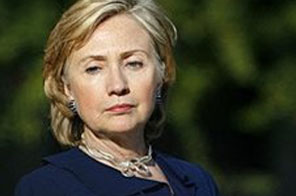Clinton vows to help NIreland
BELFAST: Secretary of State Hillary Clinton was on Monday to offer renewed US support for Northern Ireland's peace process and help to resolve a political stand-off threatening its power-sharing government.
Clinton was in Belfast to meet the province's leaders and make a major speech to its assembly, in a bid to boost efforts to defuse the row which has brought the fragile cross-community administration to a standstill.
Northern Ireland's main parties are at loggerheads over the transfer of police and justice powers from London to Belfast as part of the devolution process.
First Minister Peter Robinson's Democratic Unionist Party and his deputy Martin McGuinness's Sinn Fein agree in principle on the transfer of responsibility, but disagree over the timing and details.
The power-sharing administration took office in Belfast in May 2007 after elections and a landmark accord between the Protestant, conservative, pro-British DUP and Catholic socialist republicans Sinn Fein, long fierce rivals.
Republicans want Northern Ireland to leave the United Kingdom and join the Republic of Ireland to the south.
"I will certainly provide as much encouragement and support as I can" in efforts to resolve the deadlock, Clinton was to say in her address at Belfast's Stormont seat of government.
Clinton will be the highest-ranking foreign government official to address the devolved body, according to officials organising the secretary's trip.
"This is a critical moment," a senior State Department official told reporters travelling with Clinton.
"She is here to demonstrate US support for the process and for moving forward on devolution of policing and justice, which is a key final piece in this process. And that's going to be her message to Stormont.
"She wants to talk to the people and show her and our commitment to finishing this job at... what she believes is a crucial moment.
"There's an opportunity to advance and complete a set of measures that they've been working on for a long time. Failing to do that would risk leading to either stagnation or regression."
He added: "She is not brokering a deal but she is... very familiar with all of the details in this process and she wants to hear from all sides and help in any way she can."
On Sunday Clinton visited London and Dublin, key brokers in the peace process, where she said the men of violence were history and vowed US political support for Northern Ireland's leaders, and investment for its economy.
During a press conference in Dublin with Irish Prime Minister Brian Cowen, Clinton said remaining differences can be overcome.
"Clearly there are questions and some apprehensions," she said.
"But I believe that due to the concerted effort of the British government, the Irish government, the support of friends like us in the United States, that the parties understand that this is a step they must take together."
In London, Clinton stressed the need to fully implement the peace process started by the 1998 Good Friday Agreement, which ended three decades of the so-called Troubles in Northern Ireland which killed at least 3,500 people.
"To me, terrorism is terrorism. Those who would try to disrupt the peace of people going about their daily lives are out of step and out of time," she told reporters after talks with British Foreign Secretary David Miliband.
In addition to the political row, fears of renewed violence were raised in March when two British soldiers and a policeman were killed in attacks claimed by dissident republican paramilitary groups.
On Sunday, a republican group responsible for dozens of murders during the Troubles announced it was laying down its arms.
The Irish National Liberation Army (INLA), a splinter group of the Irish Republican Army (IRA), said "the armed struggle is over".
"The objective of a 32-county socialist republic (uniting Ireland) will be best achieved through exclusively peaceful political struggle," said a spokesman for the INLA's political wing, the Irish Republican Socialist Party.
Clinton's husband Bill was heavily involved in the Northern Ireland peace process during his 1993-2001 tenure as US president.






